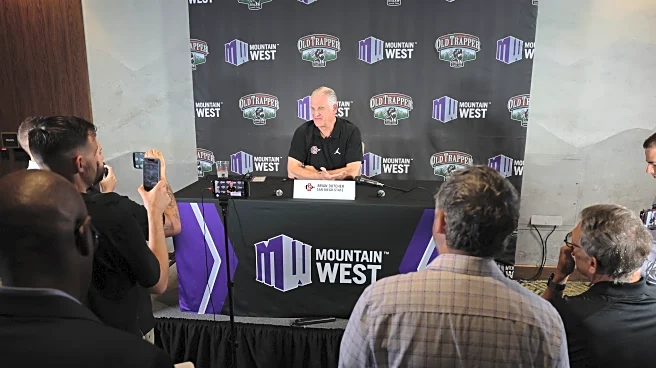Mountain West Basketball Media Day in Las Vegas last week was a one morning turnaround of radio, podcasts, TV, print and local media interviews flowing in one open space. It was a short-and-sweet media engagement
perhaps befitting of the anticipation or fate of the MW as know it.
Even with some uncertainty, coaches and players made their rounds with the familiar theme of optimism, commitment and continuity in the air. Like any serious athlete and coach, it was going to be business as usual, despite what’s going on with other dynamics.
The condensed version of how we got here
The chaos of college realignment for the Mountain West started in 2023 when the Pac-12 imploded after failing to secure a new media-rights deal. The Pac-12 collapse caused 10 of the 12 schools to leave for other power conferences.
Retaining the Pac conference name, NCAA tourney credits, and revenue streams, the then-Pac-2 needed to fill their schedule to possibly rebuild the league. A schedule alliance with the Mountain West became a lifeline with the assumed consensus that the two remaining Pac schools (Washington and Oregon State) would fold into the MW.
But by mid-2025, the plan flipped to Mountain West core schools merging into a rebranded Pac-12. In a still fluid legal proceeding, an initial poaching case motion was filed by the MW that failed.
“It’s a procedural element,” said MW commissioner Gloria Nevarez during Geoff Grammer’s podcast at MW Media Day. “A win would have been significant, but a loss just means the court wants more information and facts before they make a ruling.”
“We’re still very optimistic about the case.”
The Mountain West outlook
The strength of the conference overall are its people.
From Nevarez to the different school administrators to the coaches across different sports, the character and holistic promise of the Mountain West has shown to be strong and continually rising.
The ability to attract talent whether on the field or court or the coaching front has been a constant.
“It’s a sub-cosmos of what’s happening in the greater college athletics space,” said Nevarez. “We’ve always been that league, when we get good coaches, ADs, presidents, players; they sometimes get recruited away, but we always find talent and develop them.”
“We’ll always keep finding ways to rebuild and re-load.”
Without Boise State, Utah State, San Diego State, Fresno State and Colorado State, the new Mountain West will soon see the likes of Grand Canyon University (GCU), Northern Illinois, UC Davis and the University of Texas at El Paso (UTEP).
UTEP will be the first new full conference member starting in 2026 and UC Davis is starting as a non-football member to become a full member in 2028.
Nevarez also noted the conference is not actively soliciting more schools at this time.
For GCU basketball, the Antelopes are already a pre-season prediction to finish fourth in the conference.
“It’s a great league and we’re very thankful for it,” said GCU head coach Bryce Drew. “The quality of coaches and players in the league are what makes this league good.”
Drew added, “It’s also great to get in the top five this year, but I think more teams can have a tremendous year. It’s not outside the realm of possibility to be a multi-bid conference this year.”
Nevarez echoed the sentiment, “I do think the multi-bid thing will probably hold true again this year in a conference with a lot of depth and competitive league play.”
What stays, what goes
If there is such thing as the lure of a mid-major, it is the fact it is a natural place for underdogs. It is a blue-collar existence, including the fight for funds and support.
On the other side of the spectrum, the arm-chair sports’ fan would still say and think the FCS and Group-of-Five are “feeder” systems.
The coaches of the Mountain West collectively have always continued to support each other and tout the values and qualities that can make them good in any conference. In fact, most coaches across most conferences share the reality of change being the only constant in the world they work in.
“When you see teams like New Mexico, Boise or a San Diego State, they don’t take a dip,” said Air Force head coach Joe Scott. “They actually get better when they lose guys, because they can get guys who might not be as good as one who left and when you have Dutch (Brian Dutcher) and Leon (Rice) believing in them and playing like a true team, they win.”
Another case-in-point, though Colorado State is departing, first-year head coach Ali Farokhmanesh apprenticed for seven years with former Ram head coach Niko Medved.
”Transitioning into this spot from being a assistant coach is because our staff is phenomenal and I’ve got guys around me that have had 15-plus years experience in the Mountain West at all levels,“ said Farokhmanesh. ”It all really helped me transition to being head coach.“
It’s another prime example for Nevarez and the essence of the Mountain West philosophy to adapt.
“People still undervalue the coaches in this league,” said Dutcher. “They know how hard it is but there are at least a couple of them who are going to be able to take 10 or even 12 new guys and still put a competitive team together.”
Eventually, even without the aforementioned schools and coaches, the spirit of the Mountain West will 100% live on, because basketball at so many levels has to live on, just as the purity of sports and community should also be part of the business and profit equation.
“In the end, we’ve got to protect college basketball,” said Rice. “It’s our duty to try to fight-the-fight and keep fighting for college athletics and keeping things right. I think that’s got to be part of our mission.”
As the Mountain West refresh will continue to bear its opening chapters on-and-off the court and field for the next two seasons, we’ll certainly see.










